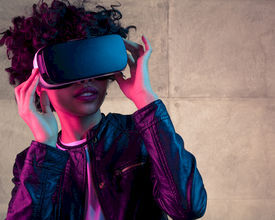It’s already here. Athletes use it to improve their techniques. Medical students employ it to practice complex surgeries. Army professionals engage in it to test different combat strategies. And simple consumers can order it online and enter the immersive world of 360 degrees content and video games.
We’re talking about the world of virtual reality. When Facebook bought acquired Oculus in 2014 for an impressive $2.3 billion, virtual reality transformed suddenly from a science fiction fantasy into an attainable goal.
Virtual reality (VR) creates artificial environments through the assistance of computer technology. People access a simulated space and have a deeply immersive experience, being unable to distinguish the difference between what’s real and what’s a product of the artificial environment.
Jeremy Bailenson, professor of Communication at Stanford University and founding director of the Virtual Human Interaction Lab, states, "With virtual reality, the gap between ‘real’ experience and mediated experience is about to get a whole lot smaller. The two won’t quite be alike, but VR is far more psychologically powerful than any medium ever invented and is poised to dramatically transform our lives. It allows us to instantaneously conjure experiences at the click of a button."
Although VR technology is not yet widely used, it’s already present in different industries, mainly enhancing training and educational experiences. And with the arrival of the Apple Vision Pro, we could be gaining momentum.
According to a Skift article, "Virtual reality continues to evolve as a media format. Vendors and developers are making new concessions based on how consumers use the technology, and the high costs associated with creating 360-degree content."
This is why we can already enjoy the VR perks at events and experiment with its applicability to increase attendee engagement and enhance the guest experience. Here are a few things you can do with VR at your next event:
Work on virtual product demos for your guests
Use VR headsets at your event by creating demos of your product. Whether it’s a new car, clothing line, or medical device, you can always showcase it using a simulated environment.
The only thing to consider is to keep these demos short - no longer than three minutes. Also, avoid placing objects close to people’s faces, because they’ll have a hard time seeing them. Apart from that, you can enhance their experience by adding music.
Use virtual reality for training and educational purposes
VR is huge when it comes to learning new skills. To make your event more interesting or help people have a better educational experience, you can work with VR developers to design a training environment.
For example, depending on the theme of your event, your attendees could land an airplane, navigate a boat, or even play a new instrument. The secret here is to coordinate their learning efforts through a fun and creative activity.
Engage your attendees in virtual game contests
A few years ago, we were obsessed with gamification. Well, apparently, this trend didn’t take off. However, we can use real games (instead of gamified activities) to bring smiles to our attendees faces’, along with a higher degree of engagement.
Invite people to compete against each other in a VR game. This will definitely make them remember your event for years.
Offer virtual tours to your attendees
Virtual tours are becoming quite common. People can visit the entire city of Helsinki, the Louvre, or the Amazonian rainforests just by putting on a headset.
Depending on your event’s goals, you can prepare a VR simulation through your brewery, packing factory, or headquarters in Tokyo. This will familiarize your attendees with your brand and help them understand your mission better.
Power up your guests’ experience by bringing fiction to life
Apart from offering your attendees virtual tours, you could invite them to experience a fantasy world they’ve never seen before.
For some of your guests, this might be the first time they’re using a VR headset, so why not make their experience truly memorable by fully immersing them a nonexistent, whimsical environment?
Conclusion
When it comes to VR, the options are limitless. And although this technology is still new, people are already creating amazing VR content and using simulated environments in different contexts. One of them is the events industry. How about you? Are you ready to step into the future?







